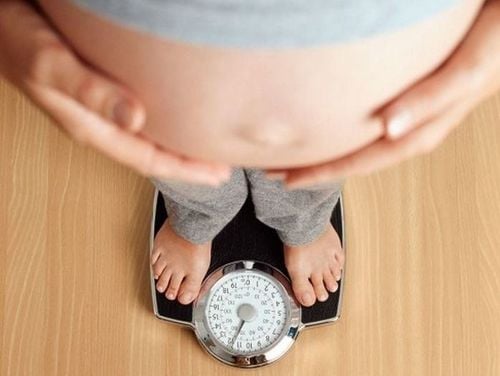This is an automatically translated article.
The article was professionally consulted by Specialist Doctor Obstetrician and Gynecologist - Department of Obstetrics and Gynecology, Vinmec Hai Phong International General Hospital
During pregnancy, it is very important for the pregnant woman to gain weight for the fetus. Each stage of pregnancy is a process where the pregnant woman's body needs to supplement the necessary nutrients for both the mother and the fetus.
1. How much weight gain during pregnancy is enough?
During pregnancy, the mother's body will begin to change, the most obvious manifestation is the increase in weight.
For each stage, the weight gain chart during pregnancy will have different changes and depending on the mother's pre-pregnancy nutritional status, weight gain is recommended as follows:
Normal nutritional status: The mother's weight gain should be 10-12 kg. Specifically:
Weight gain during pregnancy in the first 3 months: gain 1 kg Weight gain during pregnancy in the second trimester: increase by 4-5 kg : Weight gain should be 25% of pre-pregnancy weight.
With overweight and obesity nutritional status: Weight gain should reach 15% of pre-pregnancy weight.

2. How to calculate weight gain during pregnancy
The way to calculate the weight to gain for pregnant women should be based on the mother's BMI before pregnancy. BMI is a body mass index used by doctors and health professionals to determine whether someone is overweight or too thin.
Calculation: BMI = weight (kg) / [height * height] (m)
Step 1: Get weight (kg) at the time of not being pregnant. Step 2: Measure the height and calculate the square: Height (m) x Height (m). Step 3: Divide your weight by the square of your height. Through the BMI before pregnancy will assess the body condition of the mother from which to give the weight to gain during pregnancy. You can self-assess your BMI through the following statistics:
Skinny: BMI less than 18.5 Normal: BMI between 18.5 - 25 Overweight: BMI between 25-30 Fat: BMI 30 - 40 Very Fat: BMI over 40
3. The risk of unbalanced weight gain

Too little weight gain Too little weight gain can easily lead to fetal growth retardation in the uterus, fetal malnutrition, and an increased rate of premature birth. Affects lactation and not enough milk for lactation. May cause miscarriage. Excessive weight gain Affects the mother:
Pregnant women who gain too much weight have twice the risk of diabetes as women with normal weight gain and are prone to preeclampsia and high blood pressure. Pregnant women will have a high risk of facing hemorrhoids, stretch marks, problems with the pelvic area, urinary incontinence. Excess body weight also makes pregnant women feel uncomfortable and hotter than other pregnant women. Pregnant women who gain too much weight will make the fetus often tend to be larger, so the mother will be tired, the cervix dilates and presses on the diaphragm, causing difficulty breathing, leg swelling. The birth of a large baby also makes the mother lose more strength, damage to soft tissues such as tearing the vulva and vagina. The rate of cesarean section is high for large fetuses in women with normal or narrow pelvis. Caesarean section becomes more complicated and dangerous for obese pregnant women because the thick layer of fat under the skin will make it more difficult for doctors to administer anesthesia and intravenous infusion. Excessive weight gain during pregnancy will lead to overweight and obesity, making the skin loose and not firm after childbirth, difficult to regain shape after birth. Effects on the baby:
Large fetuses are also prone to hypertrophy of the organs in the body, most notably abnormalities in the heart chambers, leading to a high probability of death while in the womb. When the fetus is too large, the labor process in the mother faces many difficulties because the fetal head is large, does not fall low, causing contractions. When the baby's head is lowered, the birth process is still slow, the head is easily pressed into the pelvis, the shoulder blades are stuck in the mother's pelvic cavity. If not handled in time, the baby may suffocate. Postpartum metabolic disorders: babies born with a high birth weight are often prone to hypoglycemia, hypocalcemia, and a host of other dangers. The fetus is too big, leading to difficult birth, the baby is prone to injury during birth.
Please dial HOTLINE for more information or register for an appointment HERE. Download MyVinmec app to make appointments faster and to manage your bookings easily.













